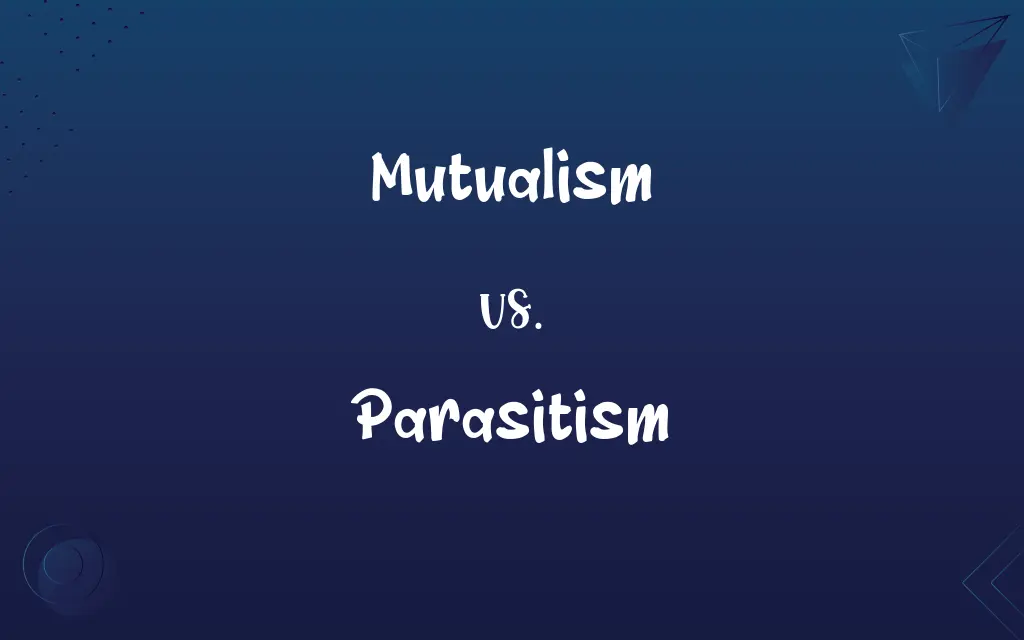Mutualism vs. Parasitism: Know the Difference

By Shumaila Saeed || Published on January 12, 2024
Mutualism is a symbiotic relationship where both parties benefit, whereas parasitism is a relationship where one organism benefits at the expense of the other.

Key Differences
In mutualism, both organisms involved gain benefits, enhancing each other's survival or growth. In parasitism, the parasite benefits while the host is harmed or disadvantaged.
Shumaila Saeed
Jan 12, 2024
Mutualism is seen in the relationship between bees and flowers, where bees get nectar and flowers get pollinated. Parasitism is exemplified by ticks feeding on mammals, benefiting while harming the host.
Shumaila Saeed
Jan 12, 2024
Mutualistic relationships often lead to evolutionary benefits for both parties, like in the case of gut bacteria in humans. Parasitic relationships can lead to diseases or even the death of the host organism.
Shumaila Saeed
Jan 12, 2024
Mutualism plays a crucial role in ecosystems by fostering interdependent relationships, like coral and algae. Parasitism, while often viewed negatively, can control population sizes and influence ecosystem dynamics.
Shumaila Saeed
Jan 12, 2024
Mutualistic interactions can be lifelong, as with certain plant and fungi relationships. Parasitic relationships might be temporary or long-term, depending on the parasite's lifecycle.
Shumaila Saeed
Jan 12, 2024
ADVERTISEMENT
Comparison Chart
Relationship Nature
Beneficial to both parties
Beneficial to one, harmful to the other
Shumaila Saeed
Jan 12, 2024
Examples
Bees and flowers, clownfish and anemones
Ticks on mammals, tapeworms in intestines
Shumaila Saeed
Jan 12, 2024
Impact on Organisms
Generally positive, enhancing survival
Negative for the host, often causing harm
Shumaila Saeed
Jan 12, 2024
Ecological Role
Promotes biodiversity and ecosystem stability
Controls populations, can cause imbalances
Shumaila Saeed
Jan 12, 2024
Duration of Interaction
Often long-term and stable
Can be temporary or long-term, varies widely
Shumaila Saeed
Jan 12, 2024
ADVERTISEMENT
Mutualism and Parasitism Definitions
Mutualism
A biological interaction advantageous to all involved organisms.
The mutualism between certain plants and their pollinators is vital for reproduction.
Shumaila Saeed
Dec 15, 2023
Parasitism
A relationship where one organism benefits at the expense of another.
In parasitism, like fleas on a dog, the parasite gains nutrients while harming the host.
Shumaila Saeed
Dec 15, 2023
Mutualism
A type of symbiosis with mutually beneficial outcomes.
The mutualism between legumes and nitrogen-fixing bacteria enriches soil fertility.
Shumaila Saeed
Dec 15, 2023
Parasitism
A biological interaction where the parasite harms the host for its gain.
The parasitism by tapeworms can lead to malnutrition in the host.
Shumaila Saeed
Dec 15, 2023
Mutualism
A strategy in which species cooperate for shared benefits.
Mutualism is a cooperation strategy where both parties gain resources or protection.
Shumaila Saeed
Dec 15, 2023
ADVERTISEMENT
Parasitism
A strategy where an organism relies on another for survival at their expense.
Parasitism is a survival strategy where parasites exploit their hosts.
Shumaila Saeed
Dec 15, 2023
Mutualism
A symbiotic relationship where both species benefit.
In mutualism, like that of the clownfish and anemone, both species gain protection.
Shumaila Saeed
Dec 15, 2023
Parasitism
An ecological phenomenon where a parasite depends on a host.
Parasitism plays a complex role in regulating certain populations in ecosystems.
Shumaila Saeed
Dec 15, 2023
Mutualism
An ecological strategy involving interdependent relationships.
Mutualism demonstrates how interconnected and interdependent different species are.
Shumaila Saeed
Dec 15, 2023
Parasitism
A type of symbiosis where only one party benefits.
Parasitism is unique among symbiotic relationships for its one-sided benefit.
Shumaila Saeed
Dec 15, 2023
Mutualism
An association between two organisms of different species in which each member benefits.
Shumaila Saeed
Dec 13, 2023
Parasitism
A relationship between two organisms of different species in which one is a parasite and the other is a host.
Shumaila Saeed
Dec 13, 2023
Mutualism
(ecology) Any interaction between two species that benefits both; typically involves the exchange of substances or services.
Shumaila Saeed
Dec 13, 2023
Parasitism
The characteristic behavior or mode of existence of a parasite or parasitic population.
Shumaila Saeed
Dec 13, 2023
Mutualism
An economic theory and anarchist school of thought that advocates a society where each person might possess a means of production, either individually or collectively, with trade representing equivalent amounts of labor in the free market.
Shumaila Saeed
Dec 13, 2023
Mutualism
The doctrine of mutual dependence as the condition of individual and social welfare.
Shumaila Saeed
Dec 13, 2023
Parasitism
(ecology) Interaction between two organisms, in which one organism (the parasite) benefits and the other (the host) is harmed.
Shumaila Saeed
Dec 13, 2023
Mutualism
The relation between two different species of organisms that are interdependent; each gains benefits from the other
Shumaila Saeed
Dec 13, 2023
Parasitism
(figuratively) A similar interaction between people.
We accused her of parasitism in taking his hard-earned money for new dresses.
Shumaila Saeed
Dec 13, 2023
Parasitism
The relation between two different kinds of organisms in which one receives benefits from the other by causing damage to it (usually not fatal damage)
Shumaila Saeed
Dec 13, 2023
Repeatedly Asked Queries
Can parasitism be beneficial in any way?
Parasitism can control host populations and contribute to ecological balance, albeit indirectly.
Shumaila Saeed
Jan 12, 2024
What is mutualism in biology?
Mutualism is a symbiotic relationship where both organisms benefit.
Shumaila Saeed
Jan 12, 2024
Are mutualistic relationships always permanent?
No, some mutualistic relationships are temporary or conditional.
Shumaila Saeed
Jan 12, 2024
What are examples of parasitism in nature?
Examples include lice on humans and mistletoe on trees.
Shumaila Saeed
Jan 12, 2024
What is the ecological role of parasitism?
Parasitism can regulate populations and influence food chains.
Shumaila Saeed
Jan 12, 2024
What are some common examples of mutualism?
Examples include pollinators with flowers and gut bacteria in humans.
Shumaila Saeed
Jan 12, 2024
Do parasites always kill their hosts?
Not necessarily; many parasites coexist with their hosts for extended periods.
Shumaila Saeed
Jan 12, 2024
How does parasitism work?
In parasitism, one organism, the parasite, lives on or in another, the host, causing it harm.
Shumaila Saeed
Jan 12, 2024
Can a mutualistic relationship turn parasitic?
Yes, environmental changes can cause shifts in symbiotic relationships.
Shumaila Saeed
Jan 12, 2024
Can mutualism evolve over time?
Yes, mutualistic relationships can evolve and become more interdependent.
Shumaila Saeed
Jan 12, 2024
Can climate change impact mutualistic relationships?
Yes, climate change can disrupt the balance in mutualistic interactions.
Shumaila Saeed
Jan 12, 2024
How does mutualism affect ecosystems?
Mutualism promotes biodiversity and ecosystem stability.
Shumaila Saeed
Jan 12, 2024
How do mutualistic relationships start?
They often develop from a need for resources or protection.
Shumaila Saeed
Jan 12, 2024
Can a single organism be both a mutualist and a parasite?
In different relationships, yes, an organism can play both roles.
Shumaila Saeed
Jan 12, 2024
Are humans involved in mutualistic relationships?
Yes, humans engage in mutualism with organisms like gut flora.
Shumaila Saeed
Jan 12, 2024
Is parasitism always harmful to the host?
Generally yes, though the degree of harm can vary.
Shumaila Saeed
Jan 12, 2024
What types of organisms engage in parasitism?
Parasitism is found in various organisms, including plants, animals, and fungi.
Shumaila Saeed
Jan 12, 2024
Are there mutualistic relationships in marine environments?
Yes, like the mutualism between coral and algae.
Shumaila Saeed
Jan 12, 2024
What are the survival advantages of parasitism?
Parasites efficiently gain resources with minimal energy expenditure.
Shumaila Saeed
Jan 12, 2024
How is mutualism different from commensalism?
In mutualism, both parties benefit, while in commensalism, one benefits without affecting the other.
Shumaila Saeed
Jan 12, 2024
Share this page
Link for your blog / website
HTML
Link to share via messenger
About Author
Written by
Shumaila SaeedShumaila Saeed, an expert content creator with 6 years of experience, specializes in distilling complex topics into easily digestible comparisons, shining a light on the nuances that both inform and educate readers with clarity and accuracy.









































































